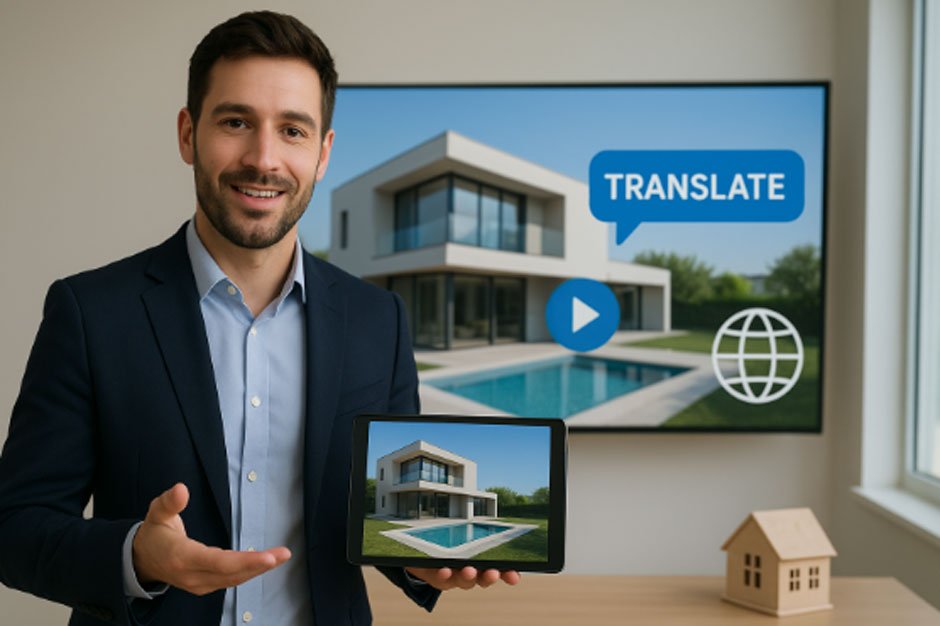When you look at the global real estate market today, one of the biggest challenges you face is language. Whether you are buying a commercial property overseas, investing in rental housing abroad, or working with international agents, communication often creates barriers. As the industry expands across borders, technology is reshaping how you approach these challenges. AI translation, particularly tools like an AI video translator, is opening new pathways for you to connect with buyers, sellers, and investors around the world.
Why AI Translation Matters in Real Estate
When you step into the property market in a different country, the language barrier can make negotiations and transactions more complex than they need to be. From browsing listings to finalizing legal documents, you depend on clarity. AI translation and machine translation software has evolved to do more than convert words; it now brings context, tone, and even voice expression into play.
For real estate, this means you can better showcase your property to international buyers and investors. Imagine creating a video tour of your property and then instantly adapting it into multiple languages, with voice translation that feels natural and emotionally expressive. This not only saves time but also ensures your message resonates with the right audience.
Creating Global Property Content with AI
The core of real estate marketing is content generation. When you post property videos online, you know the value of reaching the widest possible audience. AI now enables you to scale this process by transforming a single video into multiple language versions. With just simple text commands or prompts, you can add captions, switch the spoken audio, and even adjust the emotional tone of the voice narration.
This is crucial when you want to appeal to buyers who not only understand the property’s features but also feel a connection to the presentation. For example, a luxury villa in Spain might use warm, welcoming narration in French or German to draw interest from European buyers. The same property could then be presented in Mandarin or Japanese for Asian investors.
From Property Listings to Investment Goals
If you are working with real estate agents or creating content for property listings, AI-powered translation adds a new layer of efficiency. You no longer need separate teams to handle translation or dubbing for every market. Instead, outsourcing real estate content operations to AI ensures you stay aligned with your investment goals, while reducing costs and speeding up delivery.
In commercial property, where investors often come from different parts of the world, this advantage is even more visible. Clear, translated video presentations make it easier to explain property values, long-term rental yields, and development potential to investors who might otherwise struggle with local jargon or legal nuances.
AI Video Translation in Action
This is where an AI video translator becomes an essential tool for you. With platforms like Invideo AI, you can generate property walkthroughs and transform them into multiple languages without needing to reshoot or manually re-edit. The AI not only translates but also adjusts the voice tone to match the emotional context of the message, ensuring that potential buyers or investors feel the same impact as the original version.
By using such technology, you can make a single video work across multiple markets. This reduces the effort of creating separate content and maximizes the visibility of your property. Whether you are selling an apartment complex, a vacation home, or large-scale commercial property, your message can reach potential buyers and investors in their own language.
Beyond voice, AI translation also extends to captions and subtitles. This ensures accessibility for viewers who prefer reading or who might be in environments where audio cannot be played. Voice and captions work together to create a full bilingual experience.
Scaling Real Estate Marketing with AI
The ability to scale is what sets AI apart in real estate. Traditional dubbing and translating took a lot of time, money, and several people. With AI, you create once and distribute everywhere. This directly supports your real estate investment goals, allowing you to test new markets quickly and efficiently.
Even for property developers and agencies handling large portfolios, AI simplifies outreach. By automating translation and video adaptation, you can focus more on negotiations, customer relationships, and closing deals. For smaller agencies or individual investors, this technology levels the playing field, offering you the same reach as bigger players.
It’s also worth noting that AI video apps are increasingly integrating these features, making them accessible to you without needing advanced technical expertise. This lowers the entry barrier and allows more real estate professionals to benefit from global exposure.
Multilingual Voices and Emotional Nuance
One of the most impressive aspects of AI translation for real estate is the development of emotionally expressive multilingual voices. When you are selling a property, tone matters as much as content. A flat, robotic translation won’t convince buyers, but a nuanced voice that conveys excitement, trust, or warmth can make all the difference.
AI now allows you to select different voices based on your target audience. For instance, you might choose a calm and professional voice for corporate investors reviewing commercial property, while a more engaging and enthusiastic tone may suit families considering a vacation home. This adaptability ensures your message aligns with the emotional expectations of your audience.
Conclusion
In the fast-paced world of global real estate, AI is giving you the tools to communicate across borders with ease. From property listings and commercial investments to international sales, AI translation empowers you to scale your content, reduce costs, and reach buyers in their own language. With tools like an AI video translator, you can transform one piece of content into many, ensuring that every investor or buyer feels directly addressed. As the industry grows more global, this technology will continue to shape how you meet your real estate goals and open doors to new markets.








